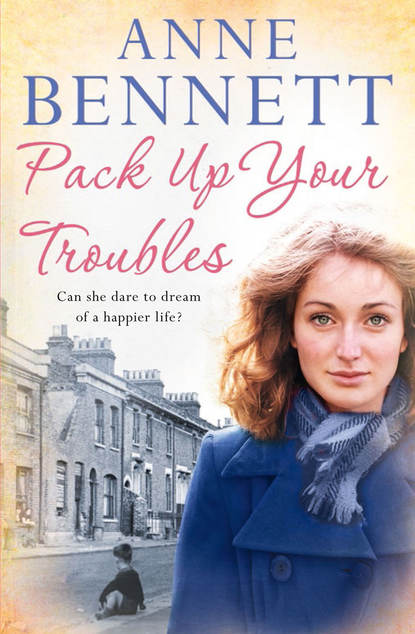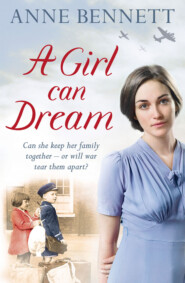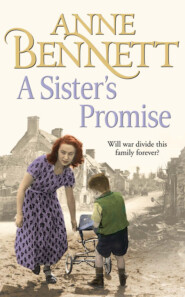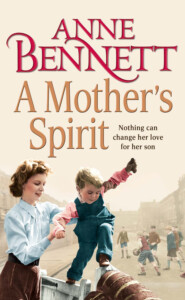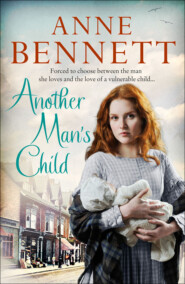По всем вопросам обращайтесь на: info@litportal.ru
(©) 2003-2025.
✖
Pack Up Your Troubles
Автор
Год написания книги
2018
Настройки чтения
Размер шрифта
Высота строк
Поля
Her Uncle Michael told her afterwards he’d have recognised her anywhere from the one photograph she’d ever had taken, which she’d sent to him. He’d said the photo didn’t do her justice and he’d commented on how like his sister Annie Maeve was. He could remember how stunning his sister had been at Maeve’s age, and how she’d had the pick of the local suitors. He could see that Maeve had the same-shape face with the high cheekbones, blue eyes, straight nose and full mouth. They even had the same way of holding their heads and once had had the same-colour hair, but Maeve’s mother’s blonde locks were now peppered with grey. She wore it in a bun on the back of her neck and for the journey Maeve had copied her, feeling the style made her look more adult.
Maeve was pleased and relieved at her uncle’s warm greeting. He pushed her extended hand aside and enveloped her in a big hug. His coat was scratchy and smelt of greasy dirt with a hint of tobacco, but none of that mattered. Maeve felt she was with one of her own, and tears of exhaustion and emotion welled up in her eyes. Not that she let them fall. This was her great adventure just beginning – no time for crying and carrying on, she told herself sternly.
She wiped her eyes surreptitiously and turned to the O’Rourkes, who were looking on in satisfaction at the respectable uncle, whom they thought a very suitable man indeed to look after the young Maeve Brannigan.
Michael shook hands with the two people that his niece had introduced him to, and thanked them sincerely for keeping her company. Maeve felt sorry to see them go, but had little time to dwell on it. Her uncle picked up her case and, holding her by the arm, he led her from the station.
She was shocked at the mean little streets, the houses pushed together, that her uncle took her through, after they’d alighted from the clanking swaying tram, which had frightened the life out of her. It wasn’t at all what she’d expected. They alighted at a road called Bristol Street and her uncle turned from there into Belgrave Road and then into Varna Road, which ran off it.
‘Here we are,’ he said suddenly, stopping outside one of the doorways. ‘Come away in and meet the family.’
Aunt Agnes, Michael’s wife, had once been a pretty girl. She still had classic good looks, high cheekbones like Maeve’s own, and deep-set dark brown eyes, with a well-formed nose and a full sensual mouth, and her brown hair fell in natural waves to her shoulders. But Agnes had always been easily offended and upset, and over the years her mouth had become petulant and surly. There was a hard glint in her beautiful eyes, as she’d wanted this niece of her husband’s in her home less than she wanted to fly to the moon.
Maeve smiled, but the words of gratitude that sprang to her lips were stilled by the cold stare and compressed lips of her aunt. Behind her, her uncle was bustling as, she was to learn, he did all the time he was in the presence of his wife. He rubbed his hands together as if he was going to receive a rare and wonderful gift as he said, ‘Aggie, Agnes, this is Maeve.’ As if, Maeve thought, she could be anyone else.
Agnes made no response whatsoever. Afterwards, Maeve was to think the insult had been as bad as if she’d spat on her or ordered her from the house. Suddenly the room seemed to grow chilly. Maeve didn’t know how to respond, and neither did her uncle, she realised. He turned his attention to the two children who were sitting playing snap on the rug placed in front of the hearth.
‘Away out of that, Billy and Jane. Have you not a word of welcome for your cousin?’
The children got to their feet reluctantly. They knew the young girl before them was the one their parents had argued long and hard about. In that house, it was often hard to know whether it was better to please their mother or their father. It was impossible to have a situation that would please the two of them.
‘Hello,’ Billy said.
It was a lacklustre greeting, and Billy saw his father frown on him. He didn’t care much. His father’s hands might be harder than his mother’s, but he never used them on him, whereas his mother . . .
Jane was older than her brother and thought this welcome was a shame for the girl. Her dad had said Maeve was eighteen, but Jane thought she didn’t look it, so she smiled and said, ‘Hello, I’m Jane. D’you want me to help you take your things up to the attic where you’ll be sleeping with me and Billy?’
‘That would be nice,’ Maeve said awkwardly, not sure whether this was the right response or not. She glanced across at her uncle, who nodded at her and she picked up her case. Jane had picked up the other bag, opened the door to the stairs that went off from the living room, and led the way.
Barely had the door closed on the girls when Maeve heard her aunt’s voice for the first time. It rose in an angry screech that she must know would be perfectly audible to them both. Maeve was to find out that in a back-to-back house, if you turned over in bed, the walls were so thin, half the street would be aware of it.
‘How long has she been foisted on us?’ Agnes demanded of her husband.
‘Agnes, we’ve discussed this.’ Though her uncle’s voice was muted, Maeve had not to strain to hear his words. ‘Till she gets on her feet, that’s all.’
‘Till she gets on her feet,’ Agnes sneered. ‘And how am I to feed her on the pittance you bring home?’
‘Surely to God we can do so for a little time. She has a job she’ll start in a few days and then she’ll pay her keep. Isn’t she my own sister’s child?’
‘Aye, and your sister has a tribe of them at home, by all accounts,’ Agnes cried. ‘Are we to fund the whole of them over here one at a time?’
Jane placed the bag on the attic floor. She was flushed with embarrassment, but no more than Maeve was herself. She knew her face must be brick red, for she felt her cheeks burn with it. She’d been going to ask the child why her mother didn’t want her there, but the answer was now apparent.
Then she heard Agnes’s voice again. ‘Are they to be hanging to your coat-tails all the days of your life? My family don’t make demands on you like this.’
‘Your family live around the doors, woman.’ Michael’s voice was loud and angry. ‘They’re never away from the place. God knows, I’ve not seen my family since the day I left.’
Jane looked at Maeve and said, ‘Mom’s worried about money. It ain’t just you, honest. See, our dad was put on short time three weeks ago.’
‘Short time?’
‘He only works three days a week, like,’ Jane explained.
Maeve sat down hard on the bed. Her uncle had never told them that, though he’d written and told her about the job in the café just before she’d left. In fact, she thought, looking around the bare attic, what he had told the Brannigans had not been totally true.
Maeve was glad that she had a bag packed with goodies from the farm, and the five-pound note her mother had pressed her to take.
‘Food will always come in useful, especially fresh stuff,’ Annie had said. ‘Though Michael will hardly need the money – him with his fine job and grand house – I’ll not have it said you’d go anywhere and not offer to pay your way. Give Michael’s wife the money and leave it up to her what she’ll do with it.’
And Maeve knew, as she sat in that attic, that both the food and the money would be welcome, for the fine job was now not so good, and the grand house had never been. The downstairs room, though, was well furnished. Two upholstered armchairs were drawn up before the fireplace and two small stools stood in one corner. There was also a drop-leaf table and four chairs with padded seats, and a matching sideboard. Even the blue-patterned linoleum was not pitted or ripped, and the rug before the fireplace looked fluffy and expensive.
So, once there had been money. Not money enough, perhaps, to lift the family out of the house that had given Maeve such a shock that day, to a better one. But there had been money enough for furnishing at least the one room. Maybe their bedroom too, for though they’d passed her uncle and aunt’s room on the first floor, Maeve wouldn’t have dared, even if Jane hadn’t been with her, to open the door and peep inside. The attic room, with its two iron bedsteads and bare boards, had not been touched much, though there were crisp white sheets and clean blankets on the beds.
‘That’s why our dad was able to meet you today, like,’ Jane said, breaking into her thoughts. ‘’Cos he’s on short time.’
And Maeve had thought he’d taken a day off because he could, because he was one of the bosses – a foreman or some such – as Michael had indicated in his letters home. There had been no preparation for a man who worked only three days a week. Suddenly she felt sorry for her Aunt Agnes. Already managing on little money, she had now to feed another mouth.
She took off her coat and hat and laid both on the bed, then picked the bag up and said to Jane, ‘I have some things here to please your mother. I think she’ll be happier when she sees them.’
It had grown quiet downstairs and though Maeve knew it was probably the uneasy silence of an argument not resolved, she was still grateful for it. She took the parcel of food downstairs and presented it to Agnes, together with the five-pound note for her keep.
The change in Agnes was swift. She pocketed the money in her apron immediately and smiled at Maeve in a belated welcoming gesture. But Maeve noticed the smile didn’t reach her eyes and she knew then that Agnes would never be a friend to her.
The meal was fine and filling enough, with the bacon and eggs and soda bread and butter from home, together with chips from the chippy that Billy had been dispatched for, and everyone tucked in with a fine appetite.
Maeve made pleasant small talk for courtesy’s sake, but still couldn’t take to her aunt, and it was obvious that her uncle was almost afraid of Agnes. Maybe he had reason, but the fact remained that the man who’d warmly welcomed Maeve at the station did not exist in this house, and that realisation saddened her. She resolved to get a place of her own as soon as possible.
The children fired questions at her about Ireland, the homestead she’d left behind and their daddy’s family, and Maeve answered them as best she could. But the journey and the emotion of the whole day had tired her out, and she was glad when it was late enough to take to her bed. She lay beside Jane, and though Jane would have liked to talk more, Maeve was too exhausted and quickly fell into a deep sleep.
After a few fraught days, during which her aunt openly showed her displeasure in having Maeve there despite the five pounds, she was glad to begin work. Maeve was no stranger to hard work and she knew what the woman had told her on the train was no lie. Work was scarce, and she’d seen men, often extremely thin, and shabbily and inadequately dressed, lolling on street corners. She knew she was lucky to get a job, and probably wouldn’t have it at all if her uncle hadn’t asked for her. She had no wish for her boss to regret his decision to employ her and didn’t quibble at the hours he asked her to work, but because they were so long she asked him to let her know if he heard of some place nearby that she could rent.
Mr Dolamartis thought this over. He’d never had such an industrious little waitress, and so beautiful too; she certainly drew the men in. But the hours were often from early morning to late night, and though she never complained, he knew sometimes Maeve had trouble getting there in time in the morning and back at night to her uncle’s house.
Above the café there was a flat, basic and small, and though Mr Dolamartis had never used it as a flat but as a storeroom, he knew he could use the room off the kitchen for storage instead, and give Maeve the chance of having a place of her own.
Maeve was thrilled. She wasn’t put off by the grime and neglect, and set to with a will to clean it all. Mr Dolamartis, amused at her industry, brought her some distemper to brighten the place up. There was a battered old sofa there already, and a table and chairs were supplied by the café. The bed was set into the wall of the living room and pulled out at night, but Maeve had no bedding, no crocks or cutlery, no curtains for the windows nor lino for the floor.
But though she’d paid over a good proportion of her wages to her Aunt Agnes, she’d kept her tips and sometimes they were sizeable. These she spent on essentials, then saved up for other household goods she wanted. She was often free in the afternoon for a few hours after lunch when Mr Dolamartis would take over. Then Maeve would usually take a tram to the city centre and stroll around the shops, enthralled by the choices available and particularly attracted to the Bull Ring, where she was able to find many of the things to make her flat more like home.
She joined organisations at the Catholic Church, St Francis’s, that she attended in Aston, in a bid to make friends with some of the younger parishioners. She’d been to the pictures and dancing with some of the young single Catholic girls on one of her rare evenings off, but she seldom went to her uncle’s house, knowing that she wouldn’t really be welcome.
TWO (#ulink_14da5984-7df8-50bf-8ff8-7390ea7c4da7)
Maeve met Brendan Hogan as she came out of Benediction one late summer’s evening in 1930, when she’d been in Birmingham less than six months. She thought he’d been to church too, but though he hadn’t, he didn’t enlighten her. He was struck by the beauty of the young woman and wanted to impress her, but though he never missed Mass or Communion – and certainly not confession, because that’s where all his sins were absolved – he hadn’t much truck with Benediction. He thought you could get too much of religion if you weren’t careful and, anyway, Benediction cut into his drinking time. He was actually on his way to a pub at Aston Cross, which he knew many ladies of ill repute frequented, when he bumped into the luscious golden-haired beauty who introduced herself as Maeve Brannigan. If the lovely lady wanted to believe he was a good clean-living Catholic boy, he wasn’t going to deny it.
Brendan was well muscled and handsome, with jet-black hair, a clear complexion, deep brown eyes and eyebrows that met across his broad forehead. Even the nose seemed to have little shape but sort of spread across his face, and his thick lips did not detract from his handsomeness, and Maeve Brannigan could not believe that such a man could possibly be interested in her.
But he was, and he smiled at her and said he was very pleased to meet her. He asked her name and Maeve told him without any hesitation, for she knew by the man’s voice that he was as Irish as herself and a good Catholic too, going to Benediction no less. She felt as if her heart had turned a somersault and Brendan knew he wasn’t going to walk away from this girl who attracted him so much.





